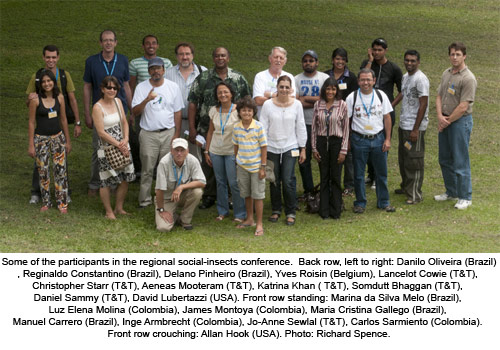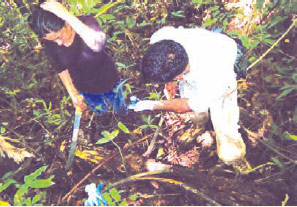 |
 |
 |
|
August 2011
|
Termites have their day at conference
The eighth biennial general meeting of the Bolivarian IUSSI – which organizes social-insect biology in northern Latin America and the Caribbean – broke new ground in two ways. It was the first such meeting in an English-speaking territory. The organization has operated almost entirely in Spanish in the past, but this year’s organizers made a special effort to ensure that it functioned well in English, Portuguese and Spanish. Discussion in the sessions shifted readily between the three, and all abstracts in the proceedings volume were in both English and either Portuguese or Spanish. This had the auxiliary benefit of impressing upon the UWI students in attendance that science speaks more than one language in our region. In addition, efforts to include colleagues from the Southern Cone were much more successful than at previous meetings. About 20% of registered participants came from Brazil, a trend expected to continue. While bees and ants predominated at previous meetings, sometimes to the near exclusion of wasps and termites, the balance was nicely redressed this year. A special highlight of the research sessions was a series of talks on termites of the central-Brazilian savanna (Cerrado) by colleagues from the University of Brasilia. One of the talks on social wasps treated Mischocyttarus baconi, a new species named in honour of Peter R. Bacon, late Professor of Zoology at UWI. Another notable feature was the inclusion of research-project reports from UWI’s undergraduate Field Course in Neotropical Ecology as a special session. This year’s field course focused on social insects, so that it was a natural choice for the students to present their original findings as part of a scientific conference on the subject. The field trip took participants up the Arima Valley to Blanchisseuse, along the North Coast past Maracas Beach, and back by way of the Santa Cruz Valley, with stops to collect specimens and enjoy the landscapes.
|

 The UWI recently hosted a regional conference on social insects that drew participants from Belgium, Brazil, Colombia, T&T and the USA. Over three meeting days and one field-trip day in early August, experts on social wasps, social bees, ants and termites met to present research results and discuss ways to better integrate colleagues working in the New World tropics.
The UWI recently hosted a regional conference on social insects that drew participants from Belgium, Brazil, Colombia, T&T and the USA. Over three meeting days and one field-trip day in early August, experts on social wasps, social bees, ants and termites met to present research results and discuss ways to better integrate colleagues working in the New World tropics. Beetle busters
Beetle busters